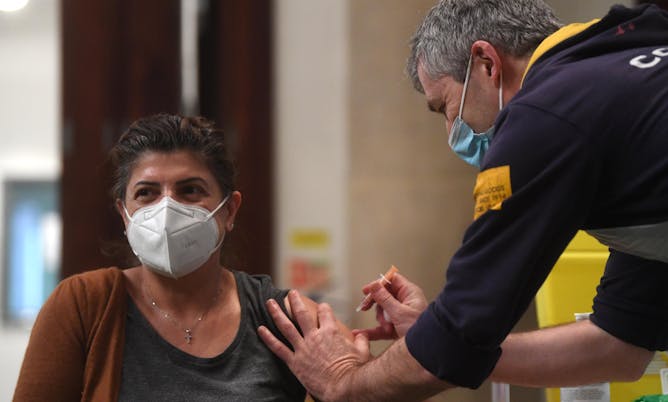|
|
|
|
The Conversation works with experts: researchers and specialists who dedicate themselves to more deeply understanding the world around us. But their output is too often lost in a blizzard of academic pages. We strive to ensure that instead it finds its way to those that need it, read it, and make use of it.
From a survey of authors writing over the last year, 55% were contacted by the media, 17% were invited to speak at conferences or other meetings, 16% were contacted by charities or NGOs, 14% were invited to collaborate on research projects, 12% were contacted by business or industry, and 5% were contacted by government bodies or invited to take part in the policymaking process.
For example, Michelle McManus, Head of Criminal Justice at Liverpool John Moores University wrote about how interactions that start online can lead to assaults in real life. She was contacted by the NSPCC, and in the years since has held workshops and worked with the NSPCC to enhance its policies and advice for children. A subsequent piece on the issue of “sexting” led to an invitation from the Children’s Commissioner to share her research on the issue, which led to further work around safeguarding children.
Or Richard Bruce, a lecturer in supply chain finance at the University of Sheffield, who wrote about the Greensill scandal and was then invited to give evidence to MPs on the House of Commons Treasury Select Committee. His expert commentary appeared in the committee’s final report and recommendations.
So while we’re dedicated to publishing interesting daily updates for our readers, behind the scenes The Conversation also helps put knowledge to work.
If you believe as we do that expertise deserves a wider audience and that facts and knowledge are the foundation of progress, please consider a donation to The Conversation. Whether a single donation or a monthly gift, your donation will help us connect those with knowledge to those that need it.
Donate now
|

|
Phoebe Roth
Commissioning Editor
|
|

SeventyFour/Shutterstock
Mark Griffiths, Nottingham Trent University
Problem binge-watching is associated with anxiety and depression.
|

Rawpixel.com / Shutterstock
Shiri Lev-Ari, Royal Holloway University of London
New research shows that increasing exposure to foreign accents makes it easier to process - and that can reduce bias which is not based on negative perceptions or prejudice.
|

Neil Hall/EPA-EFE
Liz Breen, University of Bradford; Anthony R Cox, University of Birmingham
Half a million British people need to be given a COVID vaccine each day between now and the end of January 2022.
|
Politics + Society
|
-
Rogelia Pastor-Castro, University of Strathclyde ; Rachel Chin, University of Glasgow
Macron and Johnson both have something to gain by talking tough but the reality on the ground is far more collaborative.
-
Sue Yeandle, University of Sheffield
Care workers, care recipients, think tanks and parliament itself agree that social care reform is urgently needed. But this plan’s lack of detail and insufficient funding suggest that it a ways off.
-
Lena Rose, University of Oxford
Pastors have a limited role in asylum processes of Christian converts.
|
|
Arts + Culture
|
-
Mark Goodall, University of Bradford
Get Back shines a light on the love that still existed between the Fab Four.
-
Phoebe Rumsey, University of Portsmouth
Over numerous letters, Dr Phoebe Rumsey found a great man who understood the pain and joy of “Being Alive”.
-
Keith Parry, Bournemouth University; Beth Clarkson, University of Portsmouth; Rafaelle Nicholson, Bournemouth University
Women’s sport has made leaps and bounds but there is still a lot of work to be done.
|
|
Health + Medicine
|
-
Dominic Wilkinson, University of Oxford; Jonathan Pugh, University of Oxford
How we should manage uncertainty is not a scientific issue but an ethical issue.
-
Vassilios Vassiliou, University of East Anglia; Vasiliki Tsampasian, University of East Anglia
Heart failure patients who took this drug were 22% less likely to die from heart-related causes.
|
|
Business + Economy
|
-
Renaud Foucart, Lancaster University
Social media firms in Europe are well on the way to a thousand cuts.
|
|
Environment + Energy
|
-
Stephen Joseph, University of Hertfordshire
Until train use recovers, a new approach to rail funding is needed.
|
|
| |
Featured events
|

|
— Online, Birmingham, Warwickshire, B15 2TT, United Kingdom of Great Britain and Northern Ireland — University of Birmingham
|

|
— Thomas Paine Study Centre Lecture Theatre, University of East Anglia, Norwich , Norfolk, NR4 7TJ , United Kingdom of Great Britain and Northern Ireland — University of East Anglia
|

|
— Online, Southampton, Southampton, SO17 1BJ, United Kingdom of Great Britain and Northern Ireland — University of Southampton
|

|
— Online, Zoom, Cardiff [Caerdydd GB-CRD], CF10 3BA, United Kingdom of Great Britain and Northern Ireland — Cardiff University
|
|
|
|
| |
| |
| |
| |
| |
|
|
|
|
|
|
|